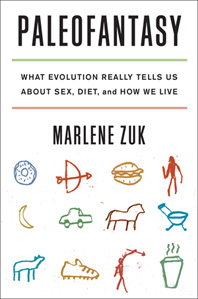The 'paleo' diet story on Campbell Live tonight spurred me to finish my review of one of the most entertaining popular books on genetics that I have read for some time. Entertaining, and informative, in equal measure. I wonder what author Marlene Zuk would have made of the TV story.
 |
Marlene Zuk (2013) Paleofantasy: what evolution really tells us about sex,diet, and how we live. Norton (New York) ISBN 978-0-393-34792-0 (paperback) |
For in that story we heard gems like this: "It's a commitment to eating food that is unadulterated, eating food in its most natural state." Paleo proponents (says the TV story) believe our most natural diet is that of our Palaeolithic cavemen ancestors. Somehow I doubt our 'cavemen' ancestors were eating avocados, beetroot, bacon or kale. (There's also an air of chemophobia, with one proponent of paleo eating stating that their diet contains "[n]othing nasty and nothing you can't pronounce" – which reminded me of the series of posters by Australian teacher James Kennedy, showing the list of chemical compounds found in natural food items: blueberries, anyone?).
Proponents of the so-called paleo diet seem to think that humans haven't evolved in the last 10,000 years (since the advent of agriculture), and that this means that our bodies aren't 'designed' to cope with the products of the agricultural revolution. (This, while eating foods that bear little resemblance to their Palaeolithic counterparts. Look at teosinte, the ancestor of maize, for example: small, stone-hard kernels arranged in a few lines on a stalk. Nothing like the fat, soft, juicy kernels on a modern cob of corn.)
As Zuk notes, the paleofantasy happily assumes that at some point in the past (around 10,000 to 40,000 years ago, depending on who you're listening to), humans were perfectly adapted to their environment, including their diet. But, she asks, why hark back to that particular point in time?
would our cave-dwelling forebears have felt nostalga for the days before they were bipedal, when life was good and the trees were a comfort zone?
Plus, of course, there's the question of just which 'cavemen' we're aspiring to be like. We've no guarantee that the life-styles of modern hunter-gatherer populations are a good approximation of life 40,000 years ago. Should we be Inuit, or Kung?
And there's no reason for us to have stopped adapting to evolutionary pressures once agriculture became the mainstay of human populations – in fact, there's a great deal of evidence to the contrary, some of which I've written about previously -the evolution of lactase tolerance, for example. Similarly, with the spread of arable farming, those with the ability to digest grains would be at an advantage, to the extent that there is a higher number of copies of the gene coding for salivary amylase in populations with a long history of eating starchy grains, compared to populations where the diet has traditionally been low in starches. And Zuk provides many examples of just how rapid evolutionary change can be, in humans and in other animals (changes in cane toad morphology, in the short span of time since their arrival in Australia, are a particularly elegant case in point). The final chapter, which gives considerable detail in answering the question, are we still evolving, would be very useful to biology teachers during human evolution classes.
In other words,
[t]he notion that humans got to a point in evolutionary history when their bodies were somehow in sync with the environment, and that some time later we went astray from those roots – whether because of the advent of agriculture, the invention of the bow and arrow, or the availability of the hamburger – reflects a misunderstanding of evolution.
As the extended title of her book points out, Zuk feels that the paleofantasy extends well beyond the current diet fad. It influences beliefs about health and illness, about family life, about sex. (This last is the focus of all sorts of wistful imaginings: the book provides an entertaining sample of these.) Do bonobos, for example, really provide a good model for how human sexual activity might have been before modern mores took over? I can't see it myself: humans and their chimpanzee cousins have follwowed separate evolutionary trajectories for 5-6 million years, and there's no good reason why either species should closely resemble the last common ancestor. And that goes for aspects of intimate morphology as much as for behaviour: I did not know that chimpanzees have penis spines – "hardened growths that may serve to sweep away the sperm of previous mates."
Zuk concludes that the paleofantasy is just that, a fairy tale – and one that limits our understanding of our own biology and evolutionary history:
But to assume that we evolved until we reached a particular point and now are unlikely to change for the rest of history, or to view ourselves as relics hampered by a self-inflicted mismatch between our environment and our genes, is to miss out on some of the most exciting new developments in evolutionary biology.
ifthethunderdontgetya™³²®© says:
“[n]othing nasty and nothing you can’t pronounce”
Do they eat bugs?
~